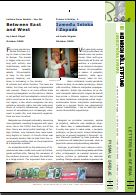

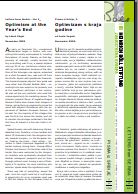
2nd Letter from Serbia: Optimism at the Year’s End.
Pisma iz Srbije, broj 02: Optimizam s kraja godine.
More...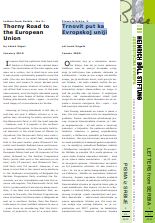
3rd Letter from Serbia: Thorny Road to the European Union.
Pisma iz Srbije, broj 03: Trnovit put ka Evropskoj Uniji.
More...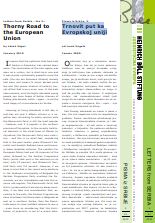
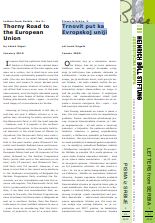
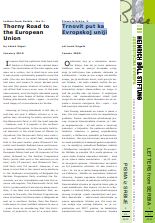
9th Letter from Serbia: EU is far away – and Kosovo is nearby.
Pisma iz Srbije, broj 09: EU je daleko – a Kosovo blizu.
More...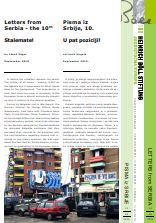
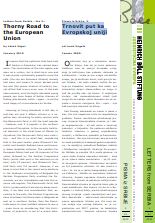
11th Letter from Serbia: A Time of Collective Self-Deception.
Pisma iz Srbije, broj 11: Razdoblje kolektivnog samoobmanjivanja.
More...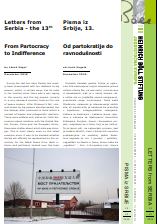
13th Letter from Serbia: From Partocracy to Indifference.
Pisma iz Srbije, broj 13: Od partokratije do ravnodušnost.
More...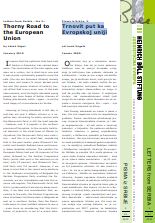
14th Letter from Serbia: Coalitions and Fractions.
Pisma iz Srbije, broj 14: Koalicije i Frakcije.
More...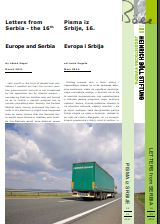
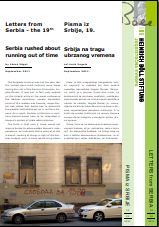
Serbia rushed about running out of time. 19th Letter from Serbia
Pisma iz Srbije, broj 19: Srbija na tragu ubrzanog vremena.
More...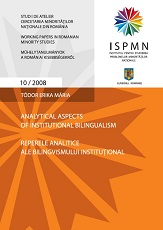
Analytical aspects of institutional bilingualism
Reperele analitice ale bilingvismului instituţional
Keywords: Institutional bilinualism; School structures in Romania; Education policy; School-life practice; Language learning;
The present study deals with institutional bilingualism in the context of school structures in Romania where the language of teaching is different from Romanian. The conclusions of the paper show a few possible directions to follow in the context of conceiving an educational policy in which the linguistic alterity represents a natural element to be taken into consideration when considering the qualitative aspects of organisational structures.
More...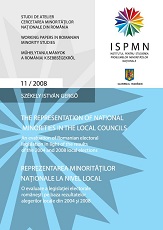
The representation of national minorities in the local councils – an evaluation of Romanian electoral legislation in light of the results of the 2004 and 2008 local elections.
Reprezentarea minorităţilor naţionale la nivel local – O evaluare a legislaţiei electorale româneşti pe baza rezultatelor alegerilor locale din 2004 şi 2008
Keywords: Local councils; national minorities; Romanian electoral legislation; 2004 and 2008 local elections; "small" minorities;
The paper assesses Romanian legislation regarding the representation of national minorities (except the Hungarians) in local councils. Most minorities are still seriously underrepresented in the local decisional fora, despite the existence of a special provision in the electoral law of 2004, that grants some sort of affirmative action for minority organizations. In order to evaluate the utility of this special provision, I re-analyzed the results of the last two local elections, comparing the actual results of the minority organizations to the hypothetical results they would have obtained in the absence of the special rule, that is, if they had been treated alike to the mainstream political parties. This allowed the identification of those cases when the minorities indeed benefited from the affirmative action provided by the law. Unfortunately, the scope of applicability of the special rule proved to be very limited, the minority organizations would have obtained most of their seats also without the application of the special provision. Moreover, the provision may have even adverse effects, as it may prevent some organizations from obtaining seats even if they obtained a number of votes that would have been sufficient for getting represented if they had been treated alike to the political parties. This is due to the logic behind the special provision, which advantages a single minority organization, often to the expense of the others. The net gain of seats due to the regulation is so small that one can conclude that there is no point for retaining the regulation in its present shape. The minorities have realized this too, and they initiated a bill in order to replace the current system with something very similar to the regulations in force at the level of the Chamber of Deputies. The paper briefly assesses this proposal too, however, the conclusions are not very optimistic in this regard either.
More...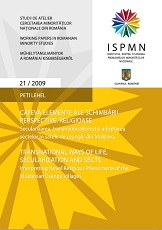
Transnational Ways of Life, Secularization and Sects. Interpreting Novel Religious Phenomena of the Moldavian Csángó Villages
Câteva elemente ale schimbării perspectivei religioase: secularizarea, transnaţionalismul şi adoptarea sectelor în satele de ceangăi din Moldova
Keywords: Transnational Ways of Life; Secularization; Religious Phenomena; Moldova; Csángó Villages; Tradition;
The paper aims to describe phenomena of modernization in Moldavian Csango villages in the context of religiosity. It interprets the most significant shifts in the life forms and traditional religiosity, the change of central values, tendencies of secularization and the emergence of sectarianism. The author argues that the religious experience gradually evades community and (Church) legitimation, so that the ever-larger individualization of religious experiences and conceptualization leads to the pluralization of worldviews. The impersonalization of social control, the changing norms that affect everyday life, the role change of religious values, the individualization of communities, basically the transforming forces of modernization on society disable the catholic church to fully integrate the Csango village population, who in rising numbers attend new teachings that offer an updated worldview, as well as a brand new set of community/religious norms. The author argues, that sectarianism/sectarianization is a part of modernizational strategies, and that as a consequence of transnational life forms, sects have become part of social mobility.
More...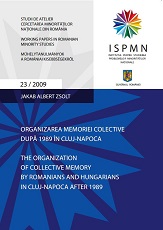
The Organization of Collective Memory by Romanians and Hungarians in Cluj-Napoca after 1989
Organizarea memoriei colective după 1989 în Cluj-Napoca.
Keywords: Cluj-Napoca; Post-1989; Collective memory of Romanians; Hungarians; 1848-1849 Revolution War of Independence; Romanian National Unity;
Transylvania, annexed to Romania in 1920, is a place of continuous Romanian-Hungarian conflicts. There is always a domain of conflict between the Hungarian minority and the Romanian majority represented by the construction, the invention and commemorative use of the past. In my ethnographic and socio-anthropologic analysis I focus on the "memory entrepreneurism", and foreground those interethnic relations and symbolic behaviours that stand behind it in the social context of the multiethnic Cluj-Napoca. The change of regime of 1989 brought along not only a political closure, but also one with on the framework of the imagined past. On the social level this resulted in the drama of the diminuation of belief in the institutions and authorities. The past constructed up to that point naturally lost its political legitimacy. There were two kinds of attitudes emerging within the self-legitimating strategies regarding the past. On the one hand the denial of continuity, the rejection of the past constructed by previous societies in the interest of the new historical order. This new historical order didn't wish to continue the previous economical, social and political relations. But on the other hand, in there was a rising need for historical depth: how can one legitimate the present and create a continuity in the historical space? Nevertheless, the new system considered it necessary to deduce the new social order from history. It had a need for the past also because it defined itself against the past, distancing itself from it: thus the past became surpassed and at the same time an example to follow. The period between 1989 and 2008 proved to be one of the most productive regarding the local construction of memory. Therefore my paper analyses the tendencies of post-1989 past construction. What previously exposed component of the past was made invisible by the new system? What was overtaken and what kind of new components were brought to the surface? What kind of conflicts were revealed, what kind of identity strategies, legitimating processes and national discourses were put into motion by the construction of the (new) memory?
More...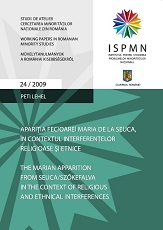
The Marian Apparition from Seuca/Szőkefalva in the Context of Religious and Ethnical Interferences
Apariţia Fecioarei Maria de la Seuca, în contextul interferenţelor religioase şi entice.
Keywords: The Marian Apparition; Seuca/Szőkefalva; Religious and Ethnical Interferences; Inter-ethnic and Denominational co-existence;
Situated on the border of Latin and Orthodox Christianity, in a region where the infrastructural and the economical possibilities were limited, the Romanian village Seuca became an internationally known place for pilgrimage due to a blind Gypsy women's public visions about Virgin Mary in the first years of the new millennium. The author presents both the history of the ethnical and confessional co-existence in the village and the economical and social problems which affected the whole community. Then, the attitudes towards the apparition of the different denominations will be highlighted by presenting also the way the seer attempts to question the different denominational opinions. The legitimating strategies of a gypsy woman influenced very much the aspects of Virgin Mary vision from Seuca.
More...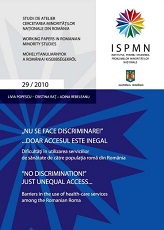
„No discrimination!” Just unequal access… Barriers in the use of health-care services among the Romanian Roma
„Nu se face discriminare!” ...doar accesul este inegal. Dificultăţi în utilizarea serviciilor de sănătate de către populaţia romă din România
Keywords: Health-care services; Romanian Roma; Discrimination; Health status; Public health care;
The paper investigates the barriers in the access to health-care services embedded in the configuration of welfare rights and the insurance-based health care system, comparing the situation of Romanians, Hungarians and Roma in the North-West Development Region of Romania. It argues that the inconsistencies of welfare regulations allow the perpetuation of the structural disadvantage of the Roma, despite of the government's declared commitment to fight Roma discrimination and promote social inclusion, as stated in the national strategies of 2002 and 2006, and reaffirmed through the participation in the Decade of Roma Inclusion 2005-2015.
More...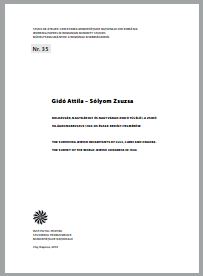
The surviving Jewish inhabitants of Cluj, Carei and Oradea. The survey of the World Jewish Congress in 1946
Kolozsvár, Nagykároly és Nagyvárad zsidó túlélői. A Zsidó Világkongresszus 1946-os észak-erdélyi felmérése
Keywords: World Jewish Congress; 1946; Holocaust period; Jewish survivors;
The Romanian Section of the World Jewish Congress (henceforth: WJC) conducted a national survey among the Jewish survivors of the Holocaust in 1946. The objective of the survey was to assess the human and material losses and record the grievances suffered by the surviving Jewish population. In addition to this the statistical data gathered was intended to serve as a basis during the negotiations of the Peace conference ending World War II and for compensation claim. This study analyses the survey and its results regarding three towns from Northern Transylvania (Cluj, Carei and Oradea) which belonged to Hungary during the Holocaust period.
More...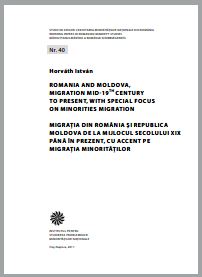
Romania and Moldova, Migration mid-19th Century to Present, with Special Focus on Minorities Migration
Migraţia din România şi Republica Moldova de la mijlocul secolului XIX până în prezent, cu accent pe migraţia minorităţilor
Keywords: Migration studies; Romania-Moldova; 19th-century - present days; Ethnic minorities; Mass migrations;
The purpose of the article is to review those main migratory fluxes from the present-day territories of Romania and Republic of Moldova which occurred in the modern period. The first version of the article was written for a universal encyclopedia of international migration history; as such, although they might sound redundant for the Romanian readers, using certain phrases was necessary for a wider audience that knows little about the region. The length at which the main migrational flows have been dealt with takes into account neither the number of migrants nor the demographic or other consequences (thus migration from recent decades is only summarily treated). Rather, the author offers a review of the circumstances which have caused the migratory flows and presents the most important estimates on the demographic effects of each major migratory stream. Sketching these constitutes a starting point for the migration history of the region but it shouldn't be considered as an in-depth analysis.
More...The search is temporarily unavailable.
We apologize in advance for the inconvenience and thank you for your kind understanding.
